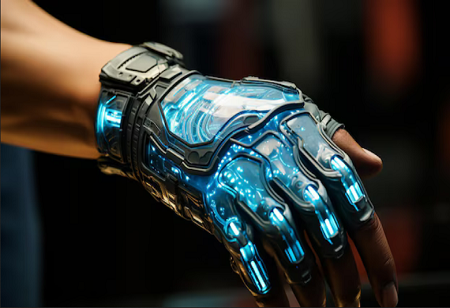
With its innovative biowearable technology Paris-based medtech company Metyos is pioneering a novel approach to chronic kidney disease (CKD) management. The company is led by Alexandre Boulanger and Co-founder Olga Chashchina. Metyos is at present focusing on a lightweight arm-worn patch designed for real-time monitoring of CKD biomarkers, enabling remote patient management.
The field of biomedical electronics, where engineering meets healthcare, is changing the way we track and control our health. Thanks to developments in sensor technology, data analytics, and connectivity, biomedical electronics is having a significant impact on the future of healthcare monitoring. Biomedical electronics is revolutionizing the healthcare monitoring sector profoundly impacting how health & wellness can be managed efficiently. In this article let us look at the multifaceted ways in which biomedical electronics is shaping the future of healthcare monitoring across multiple domains right from wearable devices to AI & beyond.
Wearable Biomedical devices
Wearable devices are visible & impactful applications of biomedical electronics. These lightweight & compact devices are equipped with sensors & wireless connectivity which allows users to monitor their health & fitness in real-time. Wearable devices are changing the way we used to track & manage our health by implementation of smartwatches, fitness trackers to medical grade wearables that include CGMs & ECG patches.
“The healthcare industry is constantly evolving with advancements in technology, the emergence of new diseases, and changes in regulatory policies. Currently, the industry is witnessing a shift towards patient-centric care, focusing on improving patient experience, engagement, and outcomes,” says Shammi Gupta, Founder & CEO, Edusoft Healthcare.
“Adopting digital health technologies like teleradiology, wearable devices, and AI-based health apps are making healthcare more accessible and convenient for patients,” he adds.
Continuous Health monitoring & Early disease detection
Wearable biomedical devices lead to enablement of continuous monitoring of vital signs which include heart rate, blood pressure, activity levels & temperature. Users gain valuable insights into their health status & behaviors by gathering & analyzing this data over time, which empowers them in making informed decisions regarding exercise, diet & lifestyle.
Wearable devices are capable of detecting early signs of diseases as well as health abnormalities, beyond basic health metrics. For instance, advanced ECG monitors can detect irregular heart rhythms which are indicative of AFib – a leading cause of stroke. Likewise, CGMs can track blood glucose levels in real-time, which help individuals with diabetes, manage their condition more effectively & prevent complications.
“Chronic disease self-management is one of the biggest opportunities that can be addressed through the recent developments of the MedTech industry,” says Muralidhar Nair, Manufacturing Director, APAC, Ethicon and Supply Chain Lead, J&J MedTech India.
“The MedTech companies are now leveraging a lot of digital technology to better connect with the customers and patients to provide them with better intelligence powered solutions across the major segments of care,” he adds.
Remote Patient Monitoring & Enhanced patient engagement
While biomedical electronics play a huge and crucial role in RPM or remote patient monitoring – a rapidly growing healthcare practice enables providers in monitoring the health of patients outside of traditional clinical settings, RPM system comprises of wearable devices, mobile apps as well as cloud-based platforms which let healthcare professionals to remotely track the vital signals, medication adherence as well as the overall well-being of the patient.
Remote Patient Monitoring fosters substantial engagement & accountability in self-care by rendering patients the access to their health data in real-time. Patients can actively participate in their treatment plans, receive feedback, set goals & obtain support from their healthcare providers and this collaborative approach not just improves patient outcomes but it also decreases the burden on healthcare systems by minimizing hospital visits & readmissions which are unnecessary.
“As more non-pervasive tasks get amalgamated into the tech solutions for the Healthcare industry, AI/ML can be significantly leveraged to automate repetitive duties at the lower end of the spectrum (Patient CRM, Drug Supply Chain Management etc.) and higher end of the spectrum (machine readable MRI scans) which can significantly prevent human diagnostic errors,” says Rohit Madhok, Vice President – Engineering, GlobalLogic.
“Another area is remote healthcare monitoring & management. Currently, it is at a mid-stage of adoption and is getting a significant boost, especially during the ongoing pandemic as a remote and safe patient care mechanism,” he adds.
Implantable Biomedical devices and Precision Medicine & Personalized therapies
Biomedical electronics comprise implantable devices which are surgically implanted inside the body for monitoring physiological functions or deliver therapeutic interventions, in addition to wearables. Defibrillators, drug delivery systems, pacemakers and neurostimulators are some of the examples of implantable devices.
By delivering targeted therapies which are based on individual patient characteristics & disease profiles implantable biomedical devices enable precision medicine approaches. For instance, implantable insulin pumps can continuously monitor blood glucose levels & automatically deliver insulin doses customized to every patient’s metabolic requirements, decreasing the risk of hypo or hyperglycemia.
While biomedical electronics is leading the way in revolutionizing the healthcare monitoring providing innovative solutions for proactive, personalized & patient-centered care. The future of healthcare monitoring is becoming highly interconnected, accessible & intelligent with the implementation of wearable devices, implantable sensors and telemedicine platforms powered by AI. Therefore, we can empower individuals to gain control of their health, improve their clinical decision-making & ultimately enhance health outcomes for populations across the globe.
We use cookies to ensure you get the best experience on our website. Read more...